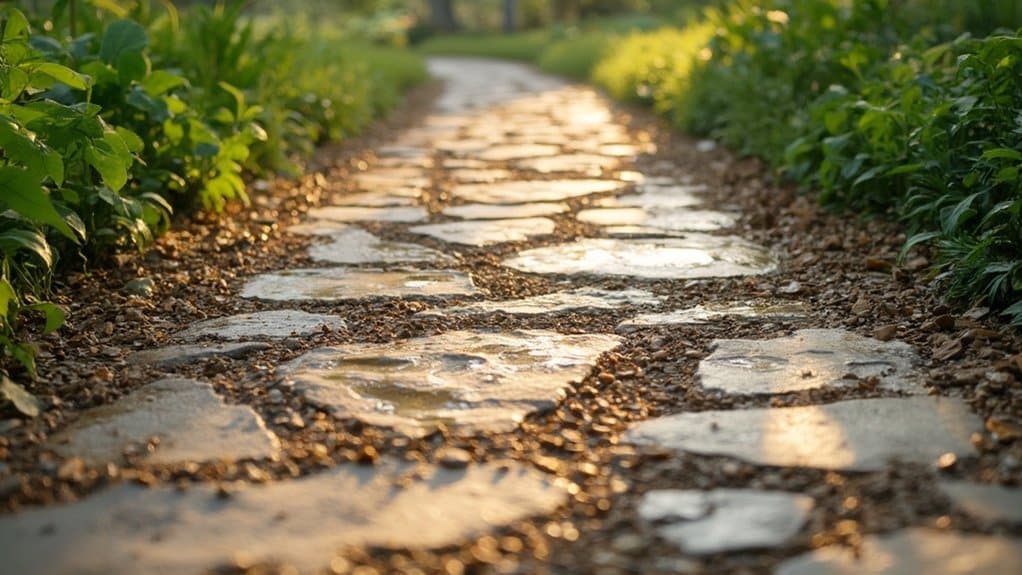The rise of resin-bound gravel in Britain tells a fascinating story, from its industrial beginnings to today's driveways and patios. Though modern resin systems emerged in the 1950s, the technique truly took off in UK commercial projects during the 1990s. As British homeowners sought practical alternatives to traditional paving, resin-bound surfaces offered a perfect match for our rainy climate, with excellent drainage and minimal pudding. The material's shift from car parks and shopping centres to residential gardens proved its worth, combining smart looks with practicality. Today's systems are tougher and more refined, making resin-bound gravel a staple in British landscaping, from Manchester city squares to countryside homes.
Key Takeaways
Resin-bound gravel has come a long way since its early days. Whilst it didn't actually start in ancient Egypt, it emerged as a practical surfacing solution in the 1950s, building on traditional road-laying techniques.
The material first proved its worth in commercial spaces like car parks and shopping centres, where its tough nature made it ideal for heavy use. By the mid-1990s, homeowners began noticing its potential, particularly for driveways and garden paths, thanks to its smart appearance and minimal upkeep needs.
One of its biggest selling points is how it handles British weather. The surface lets rainwater drain through naturally, helping prevent puddles and flooding whilst supporting local wildlife – a proper eco-friendly option.
Recent innovations have brought better resins, including plant-based options that are kinder to the environment. These improvements have made installation easier and the final product stronger, catching the eye of more property owners.
Today, resin-bound gravel has become a go-to choice for British homes. It ticks all the boxes: it's long-lasting, needs little maintenance, looks smart, and fits well with modern green building standards. No wonder it's becoming a common sight on UK driveways and paths.
Origins of Resin-Bound Surfaces
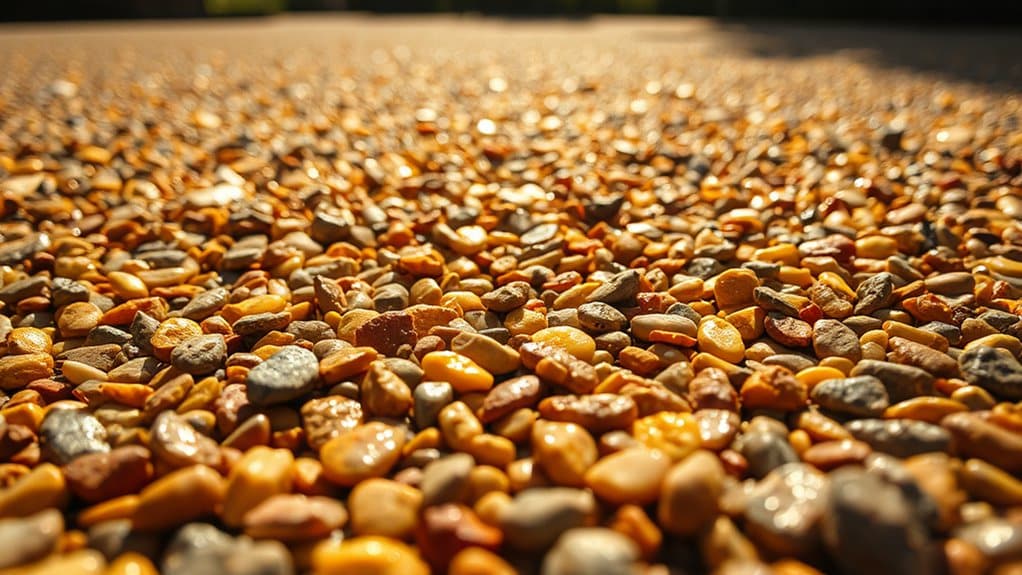
The modern resin-bound surface, whilst having ancient roots in Egyptian times, truly came into its own during the 1950s. Building upon McAdam's pioneering road construction methods, which used layered, compacted stone, today's resin systems offer a significant leap forward. By blending UV-resistant resin with carefully selected aggregates, these surfaces provide excellent drainage whilst looking smart. The materials are built to last and come in various colours and finishes to suit different settings, from driveways to garden paths. This innovation marks a practical shift in outdoor surfacing, ticking boxes for durability, environmental standards and kerb appeal. Additionally, the core components of resin-bound surfaces have historical roots dating back centuries, enhancing their significance in modern applications. This evolution reflects the foundations of McAdam's load distribution system, which paved the way for effective water management in modern surfaces.
Early Applications in Commercial Settings
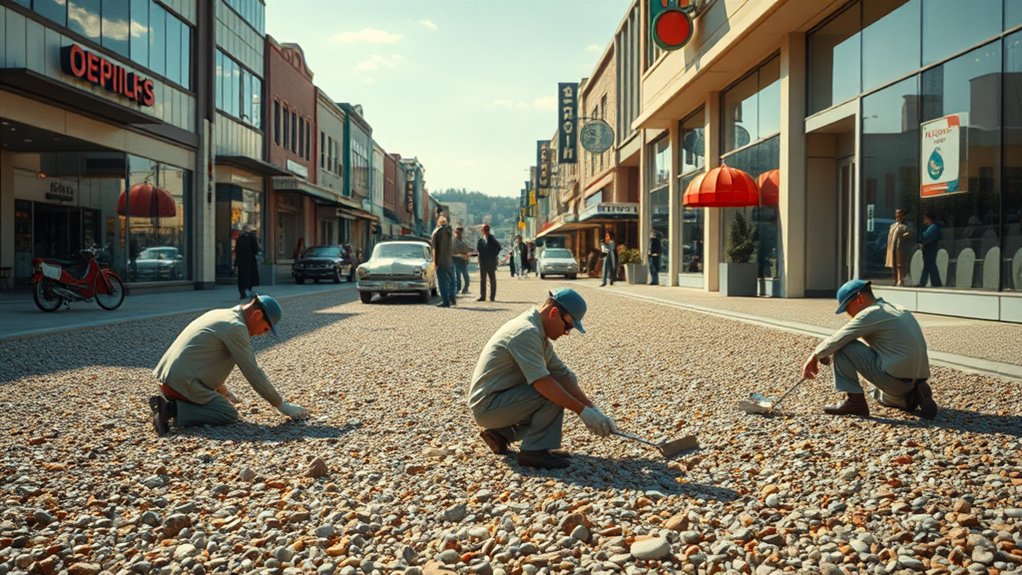
Early commercial applications saw resin-bound gravel become a popular choice due to its durability and visual appeal. The system proved adaptable across various settings, from bustling retail car parks to corporate headquarters. Its range of colours and finishes helped transform public spaces, whilst offering practical benefits for high-traffic areas. The low-maintenance nature of resin-bound surfaces meant reduced costs and minimal upkeep compared to traditional materials. Meeting UK Sustainable Drainage Systems (SuDS) requirements, the permeable surface also helped businesses meet environmental standards whilst maintaining a professional appearance. Additionally, it is designed to be visually appealing while offering excellent drainage properties, contributing to eco-friendly outdoor solutions. Furthermore, its ability to support local ecosystems ensures that businesses not only enhance their locations but also positively impact the surrounding environment.
Transition to Residential Use
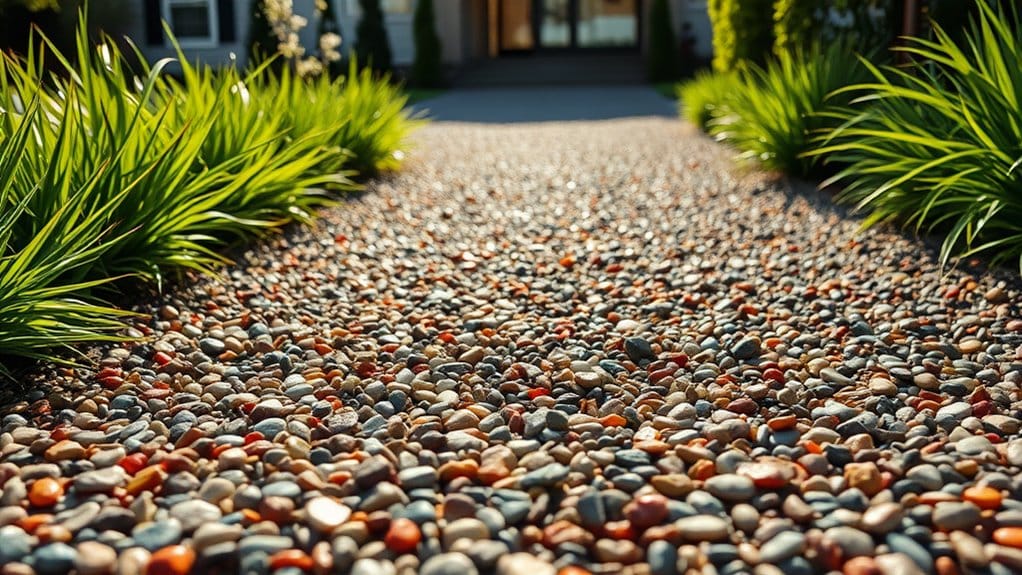
Resin-bound gravel has become a popular choice for British homeowners looking to upgrade their driveways. The system combines natural stone with clear resin, creating an attractive surface that boosts kerb appeal and property value. Unlike traditional gravel or concrete, resin-bound surfaces offer practical benefits: they're permeable, helping with drainage during Britain's wet weather, and they require minimal maintenance beyond occasional sweeping. This fully permeable solution allows water drainage, meeting Sustainable Urban Drainage Systems (SUDS) standards, which is particularly beneficial in urban environments. Additionally, resin driveways are known for their exceptional durability, making them a smart investment for high-traffic areas.
The modern, sleek finish fits well with both period properties and new builds, making it a versatile option for UK homes. With installation costs becoming more competitive, many homeowners find it a worthwhile investment, particularly when compared to block paving or tarmac alternatives.
Early Residential Adoption
Early residential adoption of resin-bound gravel in the mid-1990s marked a shift from commercial to domestic use. UK homeowners were drawn to its durability and smart appearance, particularly as it complemented both modern and traditional houses.
British firms like StoneSet developed products offering various colour schemes and patterns, from classical Cotswold stone effects to contemporary slate finishes.
The system's ability to handle Britain's frequent rainfall through natural drainage proved particularly valuable for UK properties. As prices dropped and installation techniques improved, more British homeowners opted for resin-bound driveways and paths over traditional block paving or tarmac.
The minimal disruption during installation – typically just 2-3 days for an average driveway – made it an attractive choice for busy households.
Its practical benefits, good looks and eco-friendly qualities made resin-bound gravel a popular choice amongst British homeowners, changing how we approach domestic surfacing.
Cost-Effective Alternatives
Cost-Effective Alternatives
Several budget-friendly options rival resin-bound gravel for driveways and paths:
- Resin Bonded Surfacing: Gives the look of loose gravel but needs regular upkeep. Think of it as a cheaper cousin to resin-bound – not as tough, but still smart-looking.
- Tar Chip and Spray: A solid, cost-saving choice common in British estates. It'll need the odd touch-up but costs far less than full resin systems.
- Hexagon Gravel System: Though pricier upfront, it's brilliant for busy driveways and can handle heavy cars without shifting about.
- Gravel with Stabilisers: A practical middle ground – keeps gravel in place without the price tag of resin-bound. Popular for residential drives across the UK.
When weighing up options, factor in the British weather and how much maintenance you're willing to do.
A cheaper initial cost might mean more weekend work keeping things tidy – worth thinking about before deciding.
Aesthetic Appeal Increase
Resin-bound gravel has transitioned from commercial use to become a top choice for British homes, offering both stunning looks and practical advantages.
Its versatility fits perfectly with modern design preferences, whilst the range of colours and textures available ensures it complements any property style.
From classic driveways to contemporary garden paths, you'll find countless ways to incorporate this material.
Think smooth, uniform finishes for a modern look, or distinctive patterns that add character to your outdoor space.
The material's refined appearance boosts kerb appeal and can add value to your property.
When weighing up options for your outdoor surfaces, resin-bound gravel stands out for its attractive finish, lasting durability and minimal upkeep needs.
Technological Advancements in Resin Materials
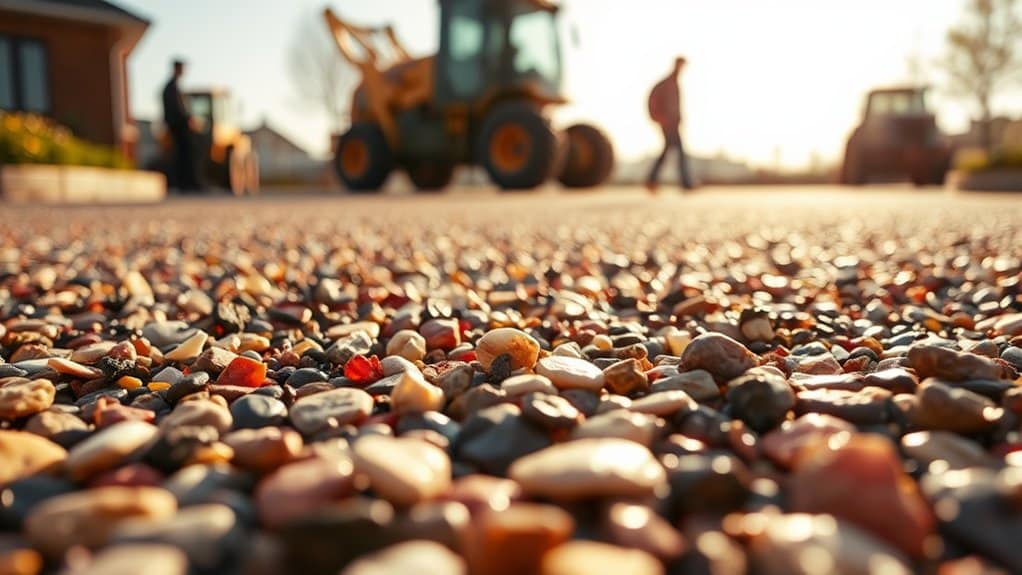
New developments in resin technology are reshaping how we use these materials across British industry and manufacturing.
The addition of nanomaterials like graphene has significantly improved strength and heat resistance. Smart resins now respond to their environment, much like how a greenhouse's ventilation system adapts to temperature changes.
Notable breakthroughs include:
- Plant-based resins that cut down on fossil fuel use
- Better manufacturing methods for tougher, more flexible products
- Self-repairing resins that mend small cracks, similar to how skin heals
- Innovative designs producing stronger yet lighter materials
These improvements are particularly valuable for UK construction and manufacturing, from stronger boat hulls to more durable flooring solutions.
The result is a new generation of resin materials that work harder and last longer whilst being kinder to the environment.
Key Characteristics of Resin-Bound Gravel
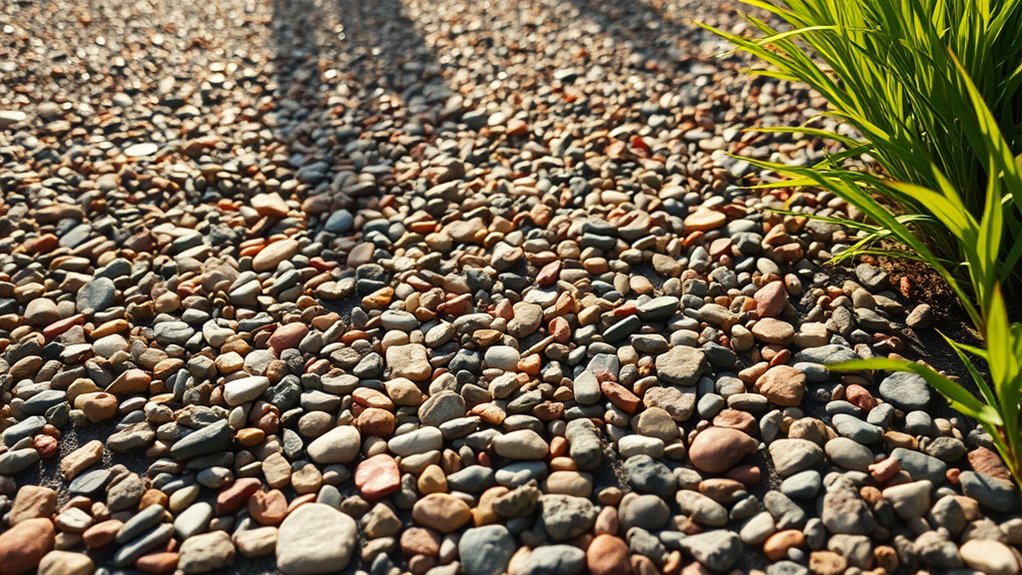
Resin-bound gravel combines resin and aggregate stones to form a tough, attractive surface. These key features make it a practical choice for UK properties:
| Feature | Description | Benefit |
|---|---|---|
| Composition | Mixture of resin and aggregates | Strong, lasting surface |
| Porosity | Allows water drainage | Perfect for British weather |
| Flexibility | Polyurethane resin option | Adapts to temperature shifts |
| Aesthetic Variety | Different stone types/colours | Matches any property style |
| Low Maintenance | Minimal upkeep needed | Stays smart year-round |
The system works brilliantly for driveways, paths and patios, offering both practical benefits and kerb appeal. It's particularly useful in areas prone to puddles, as its porous nature helps prevent standing water – a common issue in the UK climate.
Environmental Benefits of Permeable Surfaces

Permeable surfaces offer vital environmental advantages across British towns and cities. These surfaces naturally filter rainwater, removing pollutants before they reach our groundwater and rivers.
They're particularly effective at managing heavy rainfall, which is crucial given the UK's wet climate and increasing flood risks.
Think of permeable surfaces like a giant sponge: rather than rainwater rushing straight into overwhelmed drains, it seeps gradually through layers of material. This process helps prevent localised flooding on streets and pavements whilst supporting natural water cycles.
Common examples include gravel driveways, porous tarmac and permeable block paving – all practical alternatives to traditional concrete or tarmac. For British homeowners, these surfaces prove especially useful in gardens and driveways, where they reduce puddles and ice formation during winter months.
The benefits become clear during storms: whilst water pools on standard surfaces, permeable alternatives absorb it efficiently, reducing pressure on local drainage systems and lowering flood risk to properties.
Natural Water Filtration
Permeable surfaces are vital for natural water filtration in the UK, helping clean stormwater before it flows into our rivers and streams. These surfaces, like gravel driveways or grass verges, let water soak through rather than run off, filtering out harmful substances along the way.
Key benefits include:
- Natural filtering of pollutants from rainwater
- Better water quality in local waterways
- Topped-up groundwater levels
- Cooler surface temperatures through water evaporation
Common examples like resin-bound gravel driveways or garden paths work brilliantly in British gardens and urban spaces.
They're particularly useful in areas prone to flooding or where councils aim to reduce water pollution. These practical solutions help manage rainwater whilst supporting local ecosystems.
Flood Risk Mitigation
Flooding poses a serious threat to UK towns and cities, but permeable surfaces like resin-bound gravel offer a practical solution.
These surfaces help prevent flooding by allowing rainwater to soak into the ground rather than overwhelming drains and sewers. With flood damage costing the UK billions each year, smart drainage solutions are vital.
Resin-bound driveways work like a natural filter – they trap pollutants whilst letting water pass through, which helps keep our rivers and streams cleaner.
They're also part of sustainable urban drainage systems (SUDS), taking pressure off our aging drainage infrastructure.
As we face more extreme weather due to climate change, using permeable materials like resin-bound gravel in our towns and cities isn't just sensible – it's essential for protecting our communities from flooding.
Comparison With Traditional Surfacing Options
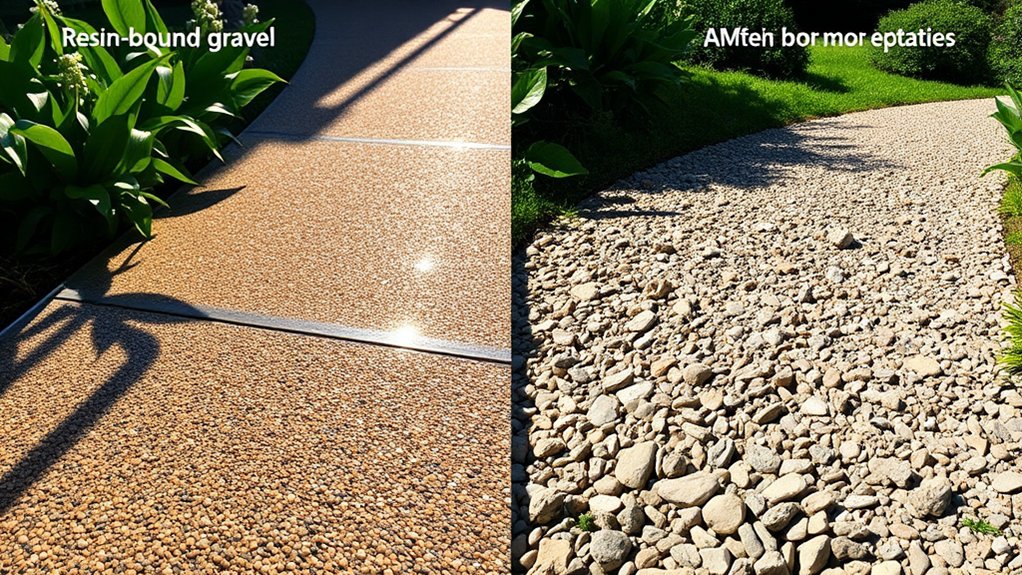
Resin-bound gravel offers clear advantages over traditional surfacing materials like tarmac, concrete and block paving.
The key differences include:
- Durability: Less likely to crack or split compared to standard tarmac and concrete
- Looks: Clean, uniform finish with various colour and pattern choices
- Upkeep: Needs little maintenance beyond occasional brushing and washing
- Drainage: Naturally porous, helping prevent puddles and flooding
Worth noting is how resin-bound surfaces cope particularly well with British weather, as their permeable nature handles heavy rain effectively.
The material's strength and visual appeal make it increasingly popular for driveways, paths and public spaces across the UK.
The Installation Process Explained

The proper installation of resin-bound gravel requires careful attention to detail for the best results. First, thoroughly clean and level the base, applying primer where needed.
Select suitable resins and aggregates that match both your durability needs and desired look. Mix these materials properly – much like mixing cake ingredients, every component needs to be well-blended.
Pour the mixture onto your prepared surface and spread it evenly with proper levelling tools, ensuring no loose stones remain exposed. Work swiftly, as the resin sets rather quickly (typically within an hour).
Leave the surface to cure fully before use – think of it like waiting for paint to dry, but with more serious consequences if rushed. Following these steps carefully will give you a smart, durable surface that'll serve you well for years to come.
Market Growth and Industry Trends
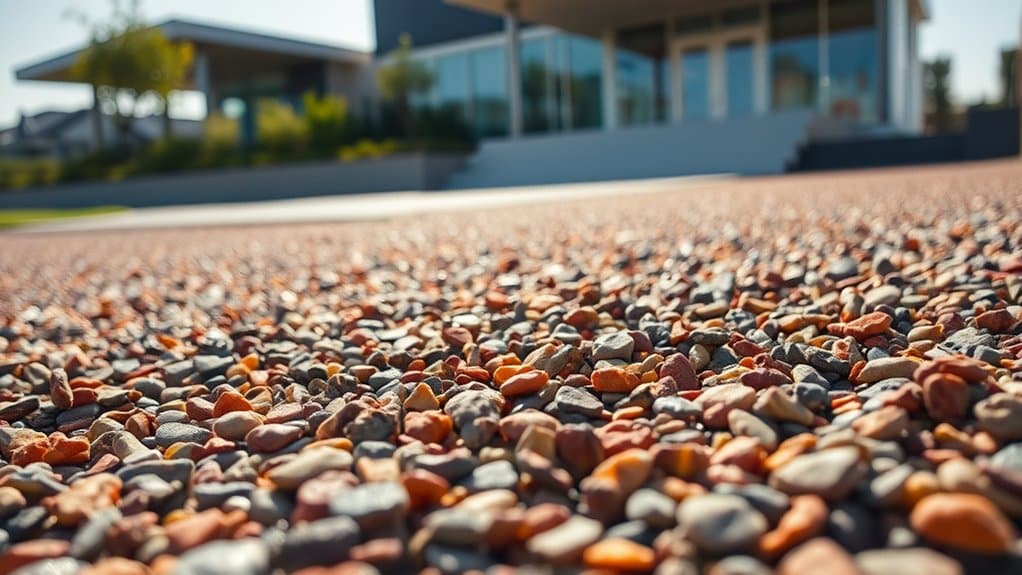
The resin-bound gravel sector shows strong growth across the UK, driven by practical benefits and changing market conditions. Several key factors are shaping the industry:
- Rising Popularity: More homeowners and businesses favour durable, low-maintenance surfaces that look smart whilst lasting years.
- Planning Requirements: UK councils increasingly support SUDS-compliant surfacing, particularly vital in areas prone to flooding.
- Design Versatility: The range of colours and patterns available suits everything from modern driveways to heritage property settings.
- Better Value: More competitive material costs have made resin-bound surfaces a practical choice for many projects.
Whilst initial installation costs remain higher than traditional gravel or concrete, growing demand and increased investment in British infrastructure point to continued market expansion.
The benefits of permeable, long-lasting surfaces are becoming widely recognised across the construction sector.
Future Perspectives on Resin-Bound Solutions
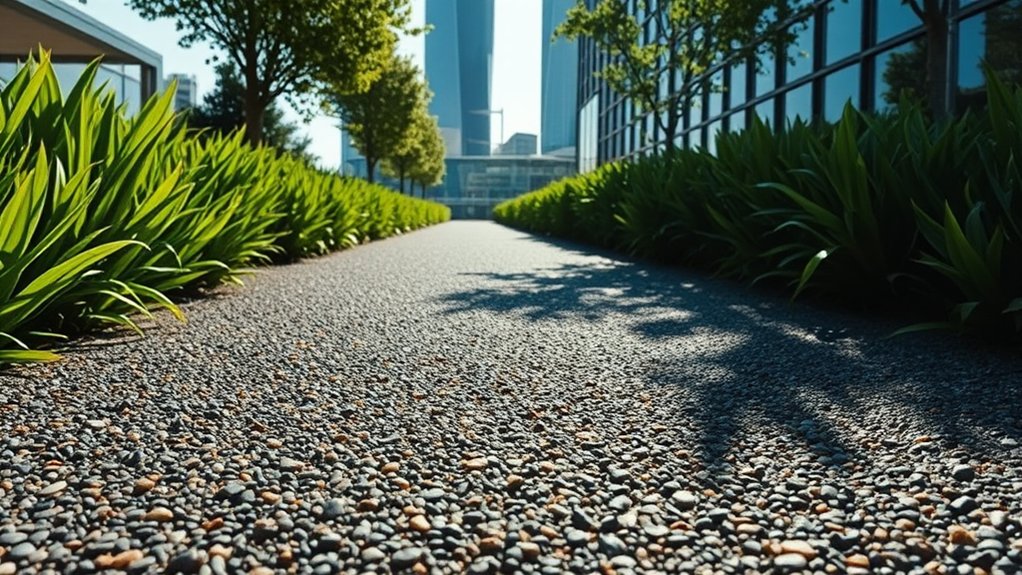
The future of resin-bound solutions in the UK is shifting towards greener practices. New installation methods and eco-friendly materials are transforming how we approach driveways, pathways and outdoor spaces.
Local councils and homeowners increasingly favour these surfaces for their durability and water permeability – crucial for Britain's rainy climate.
Recent developments include recycled glass aggregates and plant-based resins, offering practical alternatives to traditional materials. For example, a standard driveway in Manchester using sustainable resin-bound materials can reduce carbon footprint whilst meeting strict planning requirements for sustainable urban drainage.
These improvements address both environmental concerns and practical needs, though questions remain about long-term performance and cost-effectiveness.
With stricter environmental regulations expected, the industry must continue developing solutions that balance sustainability with durability.
Sustainability and Environmental Impact
Sustainability and Environmental Benefits
Resin-bound systems offer key environmental advantages through sustainable practices and eco-friendly materials:
- Recycled Materials: Uses crushed glass and recycled plastics from UK waste streams
- Water Management: Naturally drains rainwater, reducing flood risks and supporting local water tables
- Lower Carbon Impact: Manufacturing requires less energy than traditional paving methods
- Long-lasting: Minimal maintenance needs mean fewer replacements over time
The growing focus on green building practices across Britain has made resin-bound surfaces increasingly popular for driveways, garden paths and public spaces.
Their proven environmental benefits make them a practical choice for both domestic and commercial projects.
Innovations in Installation Techniques
Recent advances in resin-bound installation techniques are changing the British surfacing industry. Power floating equipment now makes application quicker whilst maintaining essential porosity. Contractors can select between light or heavy floats to match site conditions and improve efficiency.
For larger projects, forced action mixers ensure thorough blending, particularly important when working with fast-setting materials. These mixers help prevent patchy curing and reduce the risk of surface burnout.
These practical improvements tackle common installation challenges, delivering better-looking surfaces that last longer. Modern methods mean installers can complete projects more efficiently whilst maintaining high standards.
The Role of Resin-Bound Gravel in Urban Development
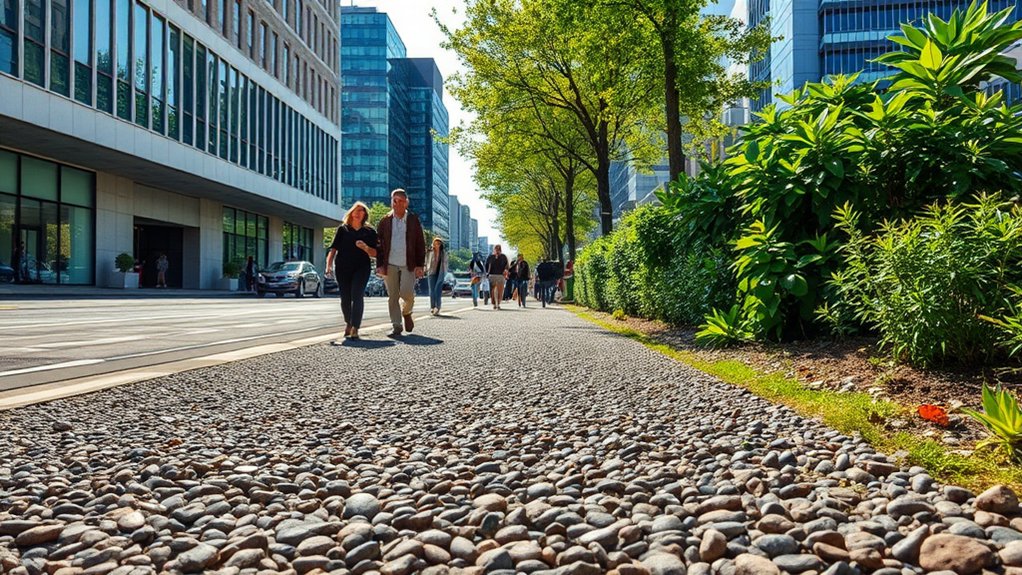
Resin-bound gravel is transforming British urban spaces, offering practical solutions for both councils and homeowners.
This versatile surface material tackles common UK challenges whilst enhancing street appeal:
- Permeability: Combats British weather by preventing surface water build-up and meeting SUDS requirements – particularly useful for driveways and public squares.
- Durability: Handles daily wear from vehicles and foot traffic, with minimal upkeep needed – ideal for high-traffic areas like town centres.
- Aesthetic Flexibility: Available in colours from Hampshire Gold to Cotswold Stone, complementing traditional and modern architecture alike.
- Environmental Impact: Uses recycled materials where possible, reducing landfill waste and supporting local sustainability goals.
The material's proven track record in UK developments, from residential estates to city centres, makes it a smart choice for modern urban planning.
Frequently Asked Questions
How Long Does Resin-Bound Gravel Typically Last?
Resin-bound gravel surfaces last between 20-30 years when properly installed and maintained. Much like a well-laid patio or driveway, the lifespan depends on key factors such as professional installation, regular cleaning and the quality of materials used. Think of it as a long-term investment for your property – whilst the initial cost might be higher than traditional gravel, its durability makes it a practical choice for British weather conditions.
Can Resin-Bound Surfaces Be Repaired if Damaged?
Resin-bound surfaces can indeed be repaired, with most damage being fixable through proper techniques. Local repairs are straightforward, much like filling a pothole in traditional paving. A matching resin mix can be blended into the damaged area, leaving your driveway or patio looking seamless once complete. Common fixes include patching small cracks, addressing loose stones and repairing worn patches – particularly useful for high-traffic areas like garden paths or driveways.
Is Resin-Bound Gravel Suitable for All Climates?
Resin-bound gravel works brilliantly across most UK weather conditions. The system's excellent drainage prevents puddles and flooding, whilst its tough structure handles our typical weather swings from frost to summer heat. Perfect for British driveways and paths, it won't crack during winter freeze-thaw periods or soften in summer sunshine. Think of it like a sturdy raincoat for your garden – it keeps working regardless of what the weather throws at it.
What Maintenance Does Resin-Bound Gravel Require?
Regular sweeping and occasional jet washing keep resin-bound gravel in top condition. A simple brush-down every few weeks removes leaves and debris, whilst an annual pressure wash shifts stubborn dirt. Apply moss treatment when needed, typically in autumn, to prevent slippery patches. Most UK homeowners find this surface particularly low-maintenance compared to loose gravel or block paving, making it ideal for driveways and garden paths.
Are There Color Options for Resin-Bound Gravel?
Resin-bound gravel comes in a wide range of colours, from natural stone hues to vibrant shades. Common choices include warm browns, classic greys and subtle beiges that match traditional British homes and gardens. Whether you're after a subtle limestone finish for your driveway or a striking golden blend for your garden path, there's a colour combination to suit your property's style.
Conclusion
Resin-bound gravel has proven itself as a remarkable advancement in modern surfacing solutions, combining practical benefits with visual appeal. From its early days in commercial projects to its current popularity in British homes and gardens, this versatile surface has adapted brilliantly to varied uses. Much like how tarmac transformed roads in the 20th century, resin-bound surfaces are now changing how we approach driveways, paths and public spaces. With continuous improvements in technology and growing demand across the UK, this surfacing option looks set to remain a key player in both urban development and domestic landscaping.
